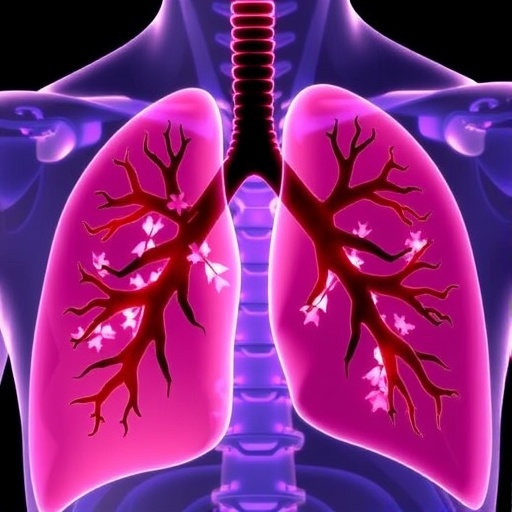In the evolving landscape of cancer therapeutics, immunotherapy has reshaped the treatment paradigm for various malignancies, notably non-small cell lung cancer (NSCLC). However, patients harboring driver gene-negative NSCLC with liver metastases represent a subgroup burdened by particularly poor prognosis and limited responsiveness to conventional immune checkpoint inhibitors (ICIs). A groundbreaking systematic review and network meta-analysis, recently published in BMC Cancer, delves deep into the comparative efficacy and safety of immune combination regimens aiming to provide a tailored therapeutic roadmap for this challenging cohort.
By deploying a Bayesian network meta-analysis framework, the investigators were able to integrate direct and indirect comparisons across eleven distinct ICI-based combination regimens. This quantitative approach enhances the robustness of treatment ranking, considering both overall survival (OS) and progression-free survival (PFS) as co-primary endpoints. Statistical analyses were rigorously performed using state-of-the-art software tools, including R (version 4.4.1) and STATA (version 17), ensuring methodological precision and reproducibility.
.adsslot_vrsXzoRNt2{width:728px !important;height:90px !important;}
@media(max-width:1199px){ .adsslot_vrsXzoRNt2{width:468px !important;height:60px !important;}
}
@media(max-width:767px){ .adsslot_vrsXzoRNt2{width:320px !important;height:50px !important;}
}
ADVERTISEMENT
One of the salient findings of this meta-analysis is the pronounced survival benefit conferred by pembrolizumab, a PD-1 immune checkpoint inhibitor, when combined with chemotherapy. This regimen outperformed others by significantly improving overall survival (HR 0.64; 95% CI 0.41–0.98), marking a milestone in therapeutic management for this recalcitrant patient group. Importantly, this benefit aligns with emerging evidence favoring PD-1 inhibitors over PD-L1 inhibitors in non-squamous NSCLC, suggesting clinical nuances in immune modulation that might influence response rates.
The analysis also brought to light the exceptional efficacy of tislelizumab plus chemotherapy in prolonging progression-free survival, with the hazard ratio for PFS reaching a striking 0.44 (95% CI 0.26–0.74). Tislelizumab, a relatively novel PD-1 inhibitor, demonstrated promising tumor control that rivals and, in some parameters, surpasses established treatment modalities. These results may indicate a shifting paradigm in selecting optimal ICIs based on individual drug characteristics and combination strategies.
Despite these encouraging outcomes, the safety profile of immune combination therapies calls for vigilant attention, especially in the context of hepatotoxicity. The liver’s unique immunological milieu, coupled with pre-existing metastatic infiltration, predisposes patients to heightened risks of high-grade adverse events. The findings emphasize that hepatotoxic adverse events were notably more frequent in these cohorts, necessitating intensified monitoring and possibly preemptive management strategies during therapy.
The complex interplay between the host immune system and tumor microenvironment within hepatic tissue constitutes a critical determinant of immunotherapy success. The immune suppressive characteristics of liver metastases, including the presence of regulatory T cells, myeloid-derived suppressor cells, and altered cytokine milieu, contribute to attenuated ICI efficacy. This meta-analysis indirectly supports the hypothesis that combining ICIs with chemotherapy may enhance antigen presentation and reverse immune tolerance, thereby overcoming hepatic immunosuppression.
Clinical translation of these insights advocates for a more tailored approach in managing driver gene-negative NSCLC with liver metastasis. The data suggest that pembrolizumab-chemotherapy and tislelizumab-chemotherapy combinations hold the most promise as first-line regimens. Nonetheless, the heterogeneity in patient responses and safety signals underscores the need for individualized treatment strategies, potentially guided by biomarkers predictive of both efficacy and toxicity.
Future research directions emerging from this work point toward optimizing dosing schedules, refining patient selection through molecular profiling, and integrating adjunct therapies that modulate the hepatic immune environment. Large-scale prospective trials are warranted to validate these findings and to explore the role of emerging ICIs and novel agents in combination paradigms for this high-risk population.
Additionally, the study’s methodological rigor—employing Bayesian statistics and network meta-analysis—sets a new benchmark for oncology meta-research. This approach, by drawing comprehensive comparisons across multiple interventions, enables clinicians and policymakers to make evidence-based decisions without direct head-to-head trials, thus accelerating therapeutic advancements.
The implications of this meta-analysis extend beyond NSCLC, shedding light on the broader challenges and opportunities of immunotherapy in metastatic settings involving immunologically complex organs like the liver. These findings advocate for a deeper understanding of organ-specific immune dynamics, which may catalyze development of targeted strategies to enhance systemic therapy outcomes.
In conclusion, the systematic review and network meta-analysis offer compelling evidence that immune checkpoint inhibitor combinations, particularly those involving pembrolizumab and tislelizumab with chemotherapy, represent a beacon of hope for patients battling driver gene-negative NSCLC complicated by liver metastasis. This nuanced evaluation of efficacy and safety profiles paves the way for more personalized, effective, and safer oncological care tailored to one of the most vulnerable cancer subsets.
As the oncology community advances, integrating robust clinical data with mechanistic insights into tumor-immune interactions will be paramount. This landmark study not only charts a clinical course for improved patient outcomes but also exemplifies the sophistication of contemporary meta-analytical techniques in unraveling complex therapeutic landscapes.
Physicians and clinical researchers should heed the recommendations for enhanced liver function monitoring to mitigate hepatotoxic risk. Meanwhile, the oncology field eagerly anticipates further trials that refine immune combination strategies, optimize dosages, and elucidate biomarkers predictive of response and adverse events.
This study’s holistic approach, encompassing efficacy, safety, and immunobiology, sets a new standard in addressing the unmet needs of driver gene-negative NSCLC patients with liver metastases. It underscores the transformative potential of immunotherapy when judiciously combined and meticulously evaluated, heralding a new era of hope in lung cancer care.
Subject of Research: Efficacy and safety of immune checkpoint inhibitor combination therapies in patients with driver gene-negative non-small cell lung cancer with liver metastasis.
Article Title: The efficacy and safety of immune combination therapy in patients with driver gene-negative non-small cell lung cancer with liver metastasis: a systematic review and network meta-analysis
Article References:
Zhao, W., Li, B., Gu, Y. et al. The efficacy and safety of immune combination therapy in patients with driver gene-negative non-small cell lung cancer with liver metastasis: a systematic review and network meta-analysis. BMC Cancer 25, 1332 (2025). https://doi.org/10.1186/s12885-025-14712-w
Image Credits: Scienmag.com
DOI: https://doi.org/10.1186/s12885-025-14712-w
Tags: Bayesian network meta-analysisdriver gene-negative NSCLCimmune checkpoint inhibitors efficacyimmune combination therapyimmune-evasive tumor microenvironmentsliver metastases in cancerlung cancer immunotherapynon-small cell lung cancer treatmentoverall survival in lung cancerPhase III cancer trialsprogression-free survival in NSCLCtailored cancer treatment strategies





